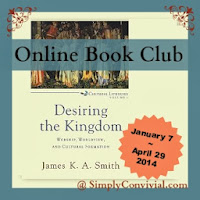
I truly appreciate that Mystie, our fearless book club leader, has broken up our readings into smaller chunks. I think it will help me to stay faithful to reading it and focus on the key issue in each section.
I enjoyed this part of the chapter because it articulates an issue that bothers me. He starts by discussing the idea of "I think therefore I am". This is not a new point of departure in the discussion of the development of educational pedagogy. He then takes on the current Christian trend of teaching about worldview. He argues that Christian education uses a " 'believing' pedagogy [which] will simply be a tweaked version of the informative paradigm." Basically, that we are substituting what we believe for what we know and while this is more essential to who we are - it is not enough - to truly shape our practice and life. As he puts it "if I bump into a 'thinking thing' and a 'believing thing' on the street, I don't think I'd notice much difference."
I have worked in and with regular schools, charter schools, Christian schools, and Catholic schools (which are Christian but have a very strong tradition of their own). I haven't been a regular classroom teacher, but most of my jobs have put me in conversation with teachers, administrators and board members. I have watched them discuss pedagogy and approach. I have to say that this is pretty much where I get caught and where the school's seem to get caught too. We are aware that our Christian worldview is no longer the cultural norm and a response is required. We have responded with "worldview" - educate Christians about what they should think and believe in response to the current state of matters.
I first learned about the term worldview in college when James Sire came to speak on our campus. I'm getting old because it seems like it was a pretty new concept at the time. That set the wheels in motion. A few years later I went through Focus on the Family's attempt at making worldview education more widely available - the Truth Project. It was eye opening, especially after my mostly secular education, how a Judeo Christian outlook really changes your view. It challenged my thinking and helped me get a better grip on how the Gospel knows no bounds. I know we frustrated our poor leaders because we ran from very conservative, been in the field missionaries to pretty liberal main line denominational types with lots of stops in between. We were not all going to start "thinking or believing right" in accordance with this DVD series anytime soon. Awareness and education are a step but they aren't the answer.
Both of these encounters, and my work in schools, helped me become more aware of my own faulty thinking and how it shaped my education. My immediate response was an attempt to figure out what right believing and thinking would look like. I am a researcher; I can find the right answer. However, as I am challenged by parenthood, having the right answer often seems totally insufficient. Even believing the right things, while better than being wrong, is not able to transform me and my kids the way that one would expect. If thinking or believing is all there is - then we are in big trouble. That's why I am excited to read more about what James is going to delve into, what he calls the "Augustinian anthropology that sees humans most fundamentally oriented and identified by love".
Honestly, that's why I can't get enough of the conversation around classical Christian education because it does aim at wisdom and virtue, truth, beauty and goodness. It believes in and desires to rediscover the right ordering of loves. My education had NOTHING to do with ordering my loves. Mostly it was a combination of "do your best morally" and "be as smart as you can be". I did fairly well on both accounts but they leave you empty in the end. I don't want my kids to simply have a fractured idea of self and education and a utilitarian understanding of life. I truly want them to see God's order and honestly come to love what He loves.
I do understand the need for appropriate head knowledge and an understanding of worldview -but honestly that is not something that speaks to the formative years of my preschoolers and early elementary kids. There is fundamental shaping taking place but it has nothing to do with academic lectures, three point sermons or memorizing their catechism. Those are all important; but, fundamentally something else is going on in them. So far I have caught the idea of reading good literature and I do think that is helping my sons to develop an imagination that includes concepts of good and evil. I hope that this book is able to shed more light on what shaping our loves looks like practically. I guess that puts a lot of pressure on the next section!

James Sire! Yes! That was the first time I heard the word "worldview" too -- same book. I read it in 1996, freshman year of college. EVERYONE was talking about it back then.
ReplyDeleteI really wonder if he's going to tell us how to shape loves, or just tells us that we need to do it, and also make fun of the ways we do it. Sort of how he mocked the mall. It'll be interesting, for sure!